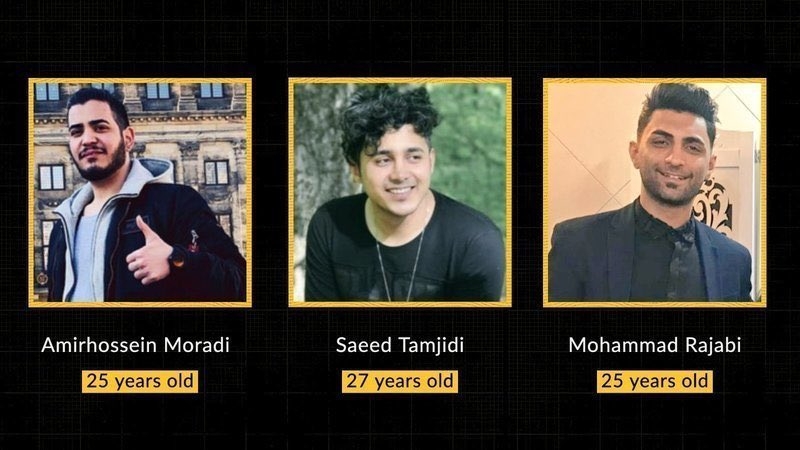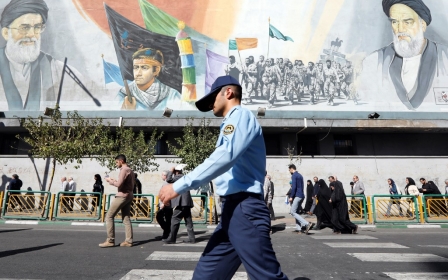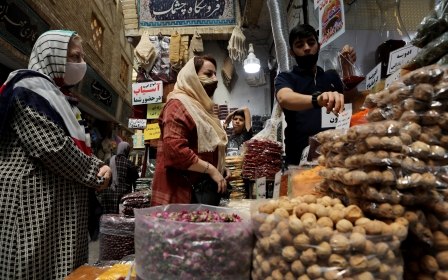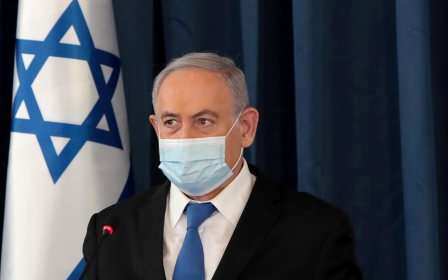Iranian online campaign against move to execute three protesters goes viral

In a rare moment of solidarity, Iranians from many social and political backgrounds have taken to social media en masse to demand that their government halt the executions of three men who were detained following nationwide demonstrations last year.
'Unfortunately, the Iranian judiciary has a long history of ignoring due process rights'
- Tara Sepehri Far, Human Rights Watch
Iranians began using the #DontExecute hashtag after a court upheld their death sentences on Tuesday. It quickly went viral worldwide with almost 4.5 million tweets.
Saeid Tamjidi, Mohammad Rajabi and Amirhossein Moradi were sentenced to death in February on charges of “participation in vandalism and arson with the intent to confront and engage in war with the Islamic Republic of Iran”.
The sentence was imposed by Abolqaem Salavati, head of branch 15 of Tehran's Revolutionary Court, a judge notorious for harsh sentences in politically motivated cases.
After Moradi was arrested in November during protests sparked by increased petrol prices that exacerbated longstanding economic hardships in the sanctions-hit country, Tamjidi and Rajabi left for Turkey.
Stay informed with MEE's newsletters
Sign up to get the latest alerts, insights and analysis, starting with Turkey Unpacked
However, Turkish authorities eventually complied with Iran’s extradition request and the two men were returned to Iran a month later.
The three detainees have been accused of committing armed robbery and arson during the protests, but their lawyers believe their confessions were made under “aberrant conditions” whilst in custody.
“We have not been permitted to enter this case, but we hope to reverse the sentence through our request for a judicial review,” tweeted lawyer Morteza Nili last week, before the sentences were upheld.
"Unfortunately, the Iranian judiciary has a long history of ignoring due process rights," Tara Sepehri Far, a researcher at Human Rights Watch, told Middle East Eye.
"In this case, it is not only unfair but it can lead to irreversible harm."
Amongst those using the hashtag was actress Nazanin Boniadi, two-time Oscar winner and filmmaker Asghar Farhadi, and football player Hossein Mahini.
Former Vice President Mohammad Ali Abtahi also tweeted using the hashtag, urging the government not to be “stubborn” in the “face of popular protests”.
Soon after the hashtag began trending, there were widespread internet disruptions reported in Iran, believed to be in response to the campaign.
Iranian authorities have used internet shutdowns to stop protests in the past, including during last year’s demonstrations.
“The Islamic Republic has a long and storied history of media censorship and all media outlets in the country are either partially or fully controlled by the authorities; or even military formations such as the Islamic Revolutionary Guard Corps,” Tallha Abdulrazaq, an Iran and Iraq expert at the University of Exeter's Strategy and Security Institute, told MEE.
Despite most popular social media platforms being banned in the country, more Iranians are using Twitter to make their voices heard through proxy servers.
“This trend on Twitter is really remarkable given the fact that people in Iran have a fear of being persecuted by the government which has a long history and record of arresting people for just putting out a tweet,” Amir Rashidi, an Iranian internet security expert and digital rights researcher, told MEE.
“People are protesting against one of the most trusted institutions of the Iranian government, which is the judiciary.”
According to Rashidi, while the recent online campaign is unprecedented due to its numbers, there have been similar online protests, including over Iran’s nuclear deal in 2015 and the health conditions of political detainees such as human rights activist Narges Mohammadi.
Mohammadi was sentenced in Tehran in May 2016 to 16 years in prison for political crimes.
'Highest per capita executioner in the world'
According to rights organisations, Iranian courts have issued at least four death sentences since the end of June and 251 people were put to death in Iran last year, coming second to China.
Many of those executed have limited access to lawyers and are often tortured during interrogations.
“As the highest per capita executioner in the world, the Iranian regime is no stranger to putting dissidents and rights activists to death,” Abdulrazaq said.
“Unfortunately for these men, Tehran will likely want to send a message that resistance is futile and you will be killed for speaking out.
"Ironically, these are the same conditions that led to the Shah's overthrow in [Ayatollah Ruhollah] Khomeini's revolution in 1979, so the Iranian regime would do well to heed their own history and how they themselves came to power.”
Earlier this week, a former Iranian defence ministry employee was executed for selling information to the CIA.
This follows the execution of a man in the city of Mashhad last week following repeated convictions for drinking alcohol.
Coronavirus effect
With the coronavirus situation in the country growing dire once again and several provinces being declared red zones, it is likely Iranians will continue their activism online in lieu of street protests.
Despite the ban on Twitter, Supreme leader Ali Khamenei and Foreign Minister Mohammad Javad Zarif are active on the platform. But they have been notably silent on the trending hashtag.
“Twitter has become a very important tool for Iranians because they know Iranian MPs and those from different branches of government are on Twitter,” Rashidi says.
“They can criticise what these politicians are doing whilst being anonymous. I do believe there’s a lot more that Twitter can do for Iran.”
President Hassan Rouhani last week warned that recent lockdown measures and economic troubles due to the coronavirus pandemic could be the cause of renewed protests in the country.
Middle East Eye delivers independent and unrivalled coverage and analysis of the Middle East, North Africa and beyond. To learn more about republishing this content and the associated fees, please fill out this form. More about MEE can be found here.




